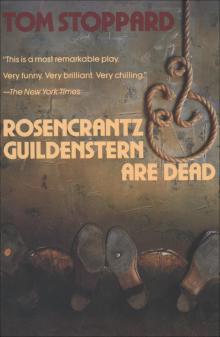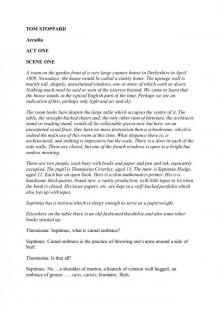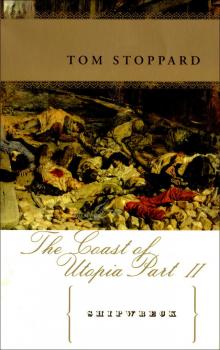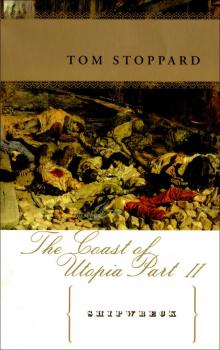- Home
- Tom Stoppard
Plays 5
Plays 5 Read online
TOM STOPPARD
Plays Five
Arcadia
The Real Thing
Night and Day
Indian Ink
Hapgood
Contents
Title Page
Arcadia
Characters
First Performance
Act One
Scene One
Scene Two
Scene Three
Scene Four
Act Two
Scene Five
Scene Six
Scene Seven
The Real Thing
Characters
First Performance
Act One
Scene One
Scene Two
Scene Three
Scene Four
Act Two
Scene Five
Scene Six
Scene Seven
Scene Eight
Scene Nine
Scene Ten
Scene Eleven
Scene Twelve
Night and Day
Characters
Notes on Characters
A Note on ‘Ruth’
The Set
First Performance
Act One
Act Two
Indian Ink
Characters
First Performance
Set
Act One
Act Two
Hapgood
Characters
First Performance
Sets
Act One
Scene One
Scene Two
Scene Three
Scene Four
Scene Five
Act Two
Scene One
Scene Two
Inter-Scene
Scene Three
Scene Four
Scene Five
Scene Six
Scene Seven
About the Author
By the Same Author
Copyright
ARCADIA
Characters
in order of appearance
Thomasina Coverly
aged thirteen, later sixteen
Septimus Hodge
her tutor, aged twenty-two, later twenty-five
Jellaby
a butler, middle-aged
Ezra Chater
a poet, aged thirty-one
Richard Noakes
a landscape architect, middle-aged
Lady Croom
middle thirties
Capt. Brice, RN
middle thirties
Hannah Jarvis
an author, late thirties
Chloë Coverly
aged eighteen
Bernard Nightingale
a don, late thirties
Valentine Coverly
aged twenty-five to thirty
Gus Coverly
aged fifteen
Augustus Coverly
aged fifteen
Arcadia was first performed at the Lyttelton Theatre, Royal National Theatre, on 13 April 1993. The cast was as follows:
Thomasina Coverly Emma Fielding
Septimus Hodge Rufus Sewell
Jellaby Allan Mitchell
Ezra Chater Derek Hutchinson
Richard Noakes Sidney Livingstone
Lady Croom Harriet Walter
Captain Brice, RN Graham Sinclair
Hannah Jarvis Felicity Kendal
Chloë Coverly Harriet Harrison
Bernard Nightingale Bill Nighy
Valentine Coverly Samuel West
Gus Coverly, Augustus Coverly Timothy Matthews
Director Trevor Nunn
Designer Mark Thompson
Lighting Paul Pyant
Music Jeremy Sams
Act One
SCENE ONE
A room on the garden front of a very large country house in Derbyshire in April 1809. Nowadays, the house would be called a stately home. The upstage wall is mainly tall, shapely, uncurtained windows, one or more of which work as doors. Nothing much need be said or seen of the exterior beyond. We come to learn that the house stands in the typical English park of the time. Perhaps we see an indication of this, perhaps only light and air and sky.
The room looks bare despite the large table which occupies the centre of it. The table, the straight-backed chairs and, the only other item of furniture, the architect’s stand or reading stand, would all be collectable pieces now but here, on an uncarpeted wood floor, they have no more pretension than a schoolroom, which is indeed the main use of this room at this time. What elegance there is, is architectural, and nothing is impressive but the scale. There is a door in each of the side walls. These are closed, but one of the french windows is open to a bright but sunless morning.
There are two people, each busy with books and paper and pen and ink, separately occupied. The pupil is Thomasina Coverly, aged 13. The tutor is Septimus Hodge, aged 22. Each has an open book. Hers is a slim mathematics primer. His is a handsome thick quarto, brand new, a vanity production, with little tapes to tie when the book is closed. His loose papers, etc, are kept in a stiff-backed portfolio which also ties up with tapes.
Septimus has a tortoise which is sleepy enough to serve as a paperweight.
Elsewhere on the table there is an old-fashioned theodolite and also some other books stacked up.
Thomasina Septimus, what is carnal embrace?
Septimus Carnal embrace is the practice of throwing one’s arms around a side of beef.
Thomasina Is that all?
Septimus No … a shoulder of mutton, a haunch of venison well hugged, an embrace of grouse … caro, carnis; feminine; flesh.
Thomasina Is it a sin?
Septimus Not necessarily, my lady, but when carnal embrace is sinful it is a sin of the flesh, QED. We had caro in our Gallic Wars – ‘The Britons live on milk and meat’ – ‘lacte et carne vivunt’. I am sorry that the seed fell on stony ground.
Thomasina That was the sin of Onan, wasn’t it, Septimus?
Septimus Yes. He was giving his brother’s wife a Latin lesson and she was hardly the wiser after it than before. I thought you were finding a proof for Fermat’s last theorem.
Thomasina It is very difficult, Septimus. You will have to show me how.
Septimus If I knew how, there would be no need to ask you. Fermat’s last theorem has kept people busy for a hundred and fifty years, and I hoped it would keep you busy long enough for me to read Mr Chater’s poem in praise of love with only the distraction of its own absurdities.
Thomasina Our Mr Chater has written a poem?
Septimus He believes he has written a poem, yes. I can see that there might be more carnality in your algebra than in Mr Chater’s ‘Couch of Eros’.
Thomasina Oh, it was not my algebra. I heard Jellaby telling cook that Mrs Chater was discovered in carnal embrace in the gazebo.
Septimus (pause) Really? With whom, did Jellaby happen to say?
Thomasina considers this with a puzzled frown.
Thomasina What do you mean, with whom?
Septimus With what? Exactly so. The idea is absurd. Where did this story come from?
Thomasina Mr Noakes.
Septimus Mr Noakes!
Thomasina Papa’s landskip gardener. He was taking bearings in the garden when he saw – through his spyglass – Mrs Chater in the gazebo in carnal embrace.
Septimus And do you mean to tell me that Mr Noakes told the butler?
Thomasina No. Mr Noakes told Mr Chater. Jellaby was told by the groom, who overheard Mr Noakes telling Mr Chater, in the stable yard.
Septimus Mr Chater being engaged in closing the stable door.
Thomasina What do you mean, Septimus?
Septimus So, thus far, the only people who know abou
t this are Mr Noakes the landskip architect, the groom, the butler, the cook and, of course, Mrs Chater’s husband, the poet.
Thomasina And Arthur who was cleaning the silver, and the bootboy. And now you.
Septimus Of course. What else did he say?
Thomasina Mr Noakes?
Septimus No, not Mr Noakes. Jellaby. You heard Jellaby telling the cook.
Thomasina Cook hushed him almost as soon as he started. Jellaby did not see that I was being allowed to finish yesterday’s upstairs’ rabbit pie before I came to my lesson. I think you have not been candid with me, Septimus. A gazebo is not, after all, a meat larder.
Septimus I never said my definition was complete.
Thomasina Is carnal embrace kissing?
Septimus Yes.
Thomasina And throwing one’s arms around Mrs Chater?
Septimus Yes. Now, Fermat’s last theorem –
Thomasina I thought as much. I hope you are ashamed.
Septimus I, my lady?
Thomasina If you do not teach me the true meaning of things, who will?
Septimus Ah. Yes, I am ashamed. Carnal embrace is sexual congress, which is the insertion of the male genital organ into the female genital organ for purposes of procreation and pleasure. Fermat’s last theorem, by contrast, asserts that when x, y and z are whole numbers each raised to power of n, the sum of the first two can never equal the third when n is greater than 2.
Pause.
Thomasina Eurghhh!
Septimus Nevertheless, that is the theorem.
Thomasina It is disgusting and incomprehensible. Now when I am grown to practise it myself I shall never do so without thinking of you.
Septimus Thank you very much, my lady. Was Mrs Chater down this morning?
Thomasina No. Tell me more about sexual congress.
Septimus There is nothing more to be said about sexual congress.
Thomasina Is it the same as love?
Septimus Oh no, it is much nicer than that.
One of the side doors leads to the music room. It is the other side door which now opens to admit Jellaby, the butler.
I am teaching, Jellaby.
Jellaby Beg your pardon, Mr Hodge, Mr Chater said it was urgent you receive his letter.
Septimus Oh, very well. (Septimus takes the letter.) Thank you. (And to dismiss Jellaby.) Thank you.
Jellaby (holding his ground) Mr Chater asked me to bring him your answer.
Septimus My answer?
He opens the letter. There is no envelope as such, but there is a ‘cover’ which, folded and sealed, does the same service. Septimus tosses the cover negligently aside and reads.
Well, my answer is that as is my custom and my duty to his lordship I am engaged until a quarter to twelve in the education of his daughter. When I am done, and if Mr Chater is still there, I will be happy to wait upon him in – (He checks the letter.) – in the gunroom.
Jellaby I will tell him so, thank you, sir.
Septimus folds the letter and places it between the pages of ‘The Couch of Eros’.
Thomasina What is for dinner, Jellaby?
Jellaby Boiled ham and cabbages, my lady, and a rice pudding.
Thomasina Oh, goody.
Jellaby leaves.
Septimus Well, so much for Mr Noakes. He puts himself forward as a gentleman, a philosopher of the picturesque, a visionary who can move mountains and cause lakes, but in the scheme of the garden he is as the serpent.
Thomasina When you stir your rice pudding, Septimus, the spoonful of jam spreads itself round making red trails like the picture of a meteor in my astronomical atlas. But if you stir backward, the jam will not come together again. Indeed, the pudding does not notice and continues to turn pink just as before. Do you think this is odd?
Septimus No.
Thomasina Well, I do. You cannot stir things apart.
Septimus No more you can, time must needs run backward, and since it will not, we must stir our way onward mixing as we go, disorder out of disorder into disorder until pink is complete, unchanging and unchangeable, and we are done with it for ever. This is known as free will or self-determination.
He picks up the tortoise and moves it a few inches as though it had strayed, on top of some loose papers, and admonishes it.
Sit!
Thomasina Septimus, do you think God is a Newtonian?
Septimus An Etonian? Almost certainly, I’m afraid. We must ask your brother to make it his first enquiry.
Thomasina No, Septimus, a Newtonian. Septimus! Am I the first person to have thought of this?
Septimus No.
Thomasina I have not said yet.
Septimus ‘If everything from the furthest planet to the smallest atom of our brain acts according to Newton’s law of motion, what becomes of free will?’
Thomasina No.
Septimus God’s will.
Thomasina No.
Septimus Sin.
Thomasina (derisively) No!
Septimus Very well.
Thomasina If you could stop every atom in its position and direction, and if your mind could comprehend all the actions thus suspended, then if you were really, really good at algebra you could write the formula for all the future; and although nobody can be so clever as to do it, the formula must exist just as if one could.
Septimus (pause) Yes. (Pause.) Yes, as far as I know, you are the first person to have thought of this. (Pause. With an effort.) In the margin of his copy of Arithmetica, Fermat wrote that he had discovered a wonderful proof of his theorem but, the margin being too narrow for his purpose, did not have room to write it down. The note was found after his death, and from that day to this –
Thomasina Oh! I see now! The answer is perfectly obvious.
Septimus This time you may have overreached yourself.
The door is opened, somewhat violently. Chater enters.
Mr Chater! Perhaps my message miscarried. I will be at liberty at a quarter to twelve, if that is convenient.
Chater It is not convenient, sir. My business will not wait.
Septimus Then I suppose you have Lord Croom’s opinion that your business is more important than his daughter’s lesson.
Chater I do not, but, if you like, I will ask his lordship to settle the point.
Septimus (pause) My lady, take Fermat into the music room. There will be an extra spoonful of jam if you find his proof.
Thomasina There is no proof, Septimus. The thing that is perfectly obvious is that the note in the margin was a joke to make you all mad. (She leaves.)
Septimus Now, sir, what is this business that cannot wait?
Chater I think you know it, sir. You have insulted my wife.
Septimus Insulted her? That would deny my nature, my conduct, and the admiration in which I hold Mrs Chater.
Chater I have heard of your admiration, sir! You insulted my wife in the gazebo yesterday evening!
Septimus You are mistaken. I made love to your wife in the gazebo. She asked me to meet her there, I have her note somewhere, I dare say I could find it for you, and if someone is putting it about that I did not turn up, by God, sir, it is a slander.
Chater You damned lecher! You would drag down a lady’s reputation to make a refuge for your cowardice. It will not do! I am calling you out!
Septimus Chater! Chater, Chater, Chater! My dear friend!
Chater You dare to call me that. I demand satisfaction!
Septimus Mrs Chater demanded satisfaction and now you are demanding satisfaction. I cannot spend my time day and night satisfying the demands of the Chater family. As for your wife’s reputation, it stands where it ever stood.
Chater You blackguard!
Septimus I assure you. Mrs Chater is charming and spirited, with a pleasing voice and a dainty step, she is the epitome of all the qualities society applauds in her sex – and yet her chief renown is for a readiness that keeps her in a state of tropical humidity as would grow orchids in her drawers in January.
Septimus (definitively) Not! There are no more than two or three poets of the first rank now living, and I will not shoot one of them dead over a perpendicular poke in a gazebo with a woman whose reputation could not be adequately defended with a platoon of musketry deployed by rota.
Chater Ha! You say so! Who are the others? In your opinion? – no – no –! – this goes very ill, Hodge. I will not be flattered out of my course. You say so, do you?
Septimus I do. And I would say the same to Milton were he not already dead. Not the part about his wife, of course –
Chater But among the living? Mr Southey?
Septimus Southey I would have shot on sight.
Chater (shaking his head sadly) Yes, he has fallen off. I admired ‘Thalaba’ quite, but ‘Madoc’, (He chuckles.) oh dear me! – but we are straying from the business here – you took advantage of Mrs Chater, and if that were not bad enough, it appears every stableboy and scullery maid on the strength –
Septimus Damn me! Have you not listened to a word I said?
Chater I have heard you, sir, and I will not deny I welcome your regard, God knows one is little appreciated if one stands outside the coterie of hacks and placemen who surround Jeffrey and the Edinburgh –
Septimus My dear Chater, they judge a poet by the seating plan of Lord Holland’s table!
Chater By heaven, you are right! And I would very much like to know the name of the scoundrel who slandered my verse drama ‘The Maid of Turkey’ in the Piccadilly Recreation, too!
Septimus ‘The Maid of Turkey’! I have it by my bedside! When I cannot sleep I take up ‘The Maid of Turkey’ like an old friend!
Chater (gratified) There you are! And the scoundrel wrote he would not give it to his dog for dinner were it covered in bread sauce and stuffed with chestnuts. When Mrs Chater read that, she wept, sir, and would not give herself to me for a fortnight – which recalls me to my purpose –
Septimus The new poem, however, will make your name perpetual –
Chater Whether it do or not –
Septimus It is not a question, sir. No coterie can oppose the acclamation of the reading public. ‘The Couch of Eros’ will take the town.

 The Dog It Was That Died and Other Plays
The Dog It Was That Died and Other Plays Travesties
Travesties Jumpers
Jumpers Rosencrantz and Guildenstern Are Dead
Rosencrantz and Guildenstern Are Dead Rock 'N' Roll
Rock 'N' Roll Plays 5
Plays 5 Arcadia
Arcadia Hapgood
Hapgood Hapgood: A Play
Hapgood: A Play Every Good Boy Deserves Favor & Professional Foul
Every Good Boy Deserves Favor & Professional Foul The Coast of Utopia: Voyage, Shipwreck, Salvage
The Coast of Utopia: Voyage, Shipwreck, Salvage Lord Malquist & Mr. Moon
Lord Malquist & Mr. Moon The Real Inspector Hound and Other Plays
The Real Inspector Hound and Other Plays Tom Stoppard Plays 1
Tom Stoppard Plays 1 Lord Malquist & Mr. Moon: A Novel
Lord Malquist & Mr. Moon: A Novel Shipwreck
Shipwreck Tom Stoppard Plays 3
Tom Stoppard Plays 3 Tom Stoppard Plays 2
Tom Stoppard Plays 2 Rosencrantz and Guildenstern are dead. Arcadia
Rosencrantz and Guildenstern are dead. Arcadia